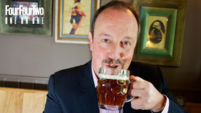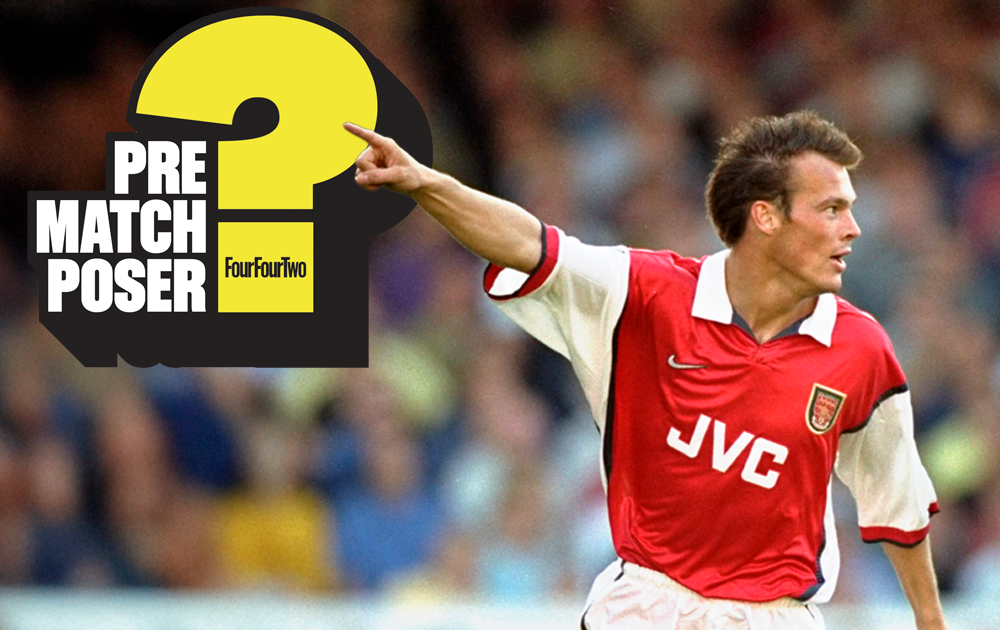The big interview: Gus Poyet – "After I played against Chelsea for Spurs, I remember thinking, 'Oh, what have I done?'"
The perils of translating for Claudio Ranieri and why Luis Suarez is a hero – former Chelsea and Tottenham midfielder Gus Poyet answers FourFourTwo readers' questions back in January 2011
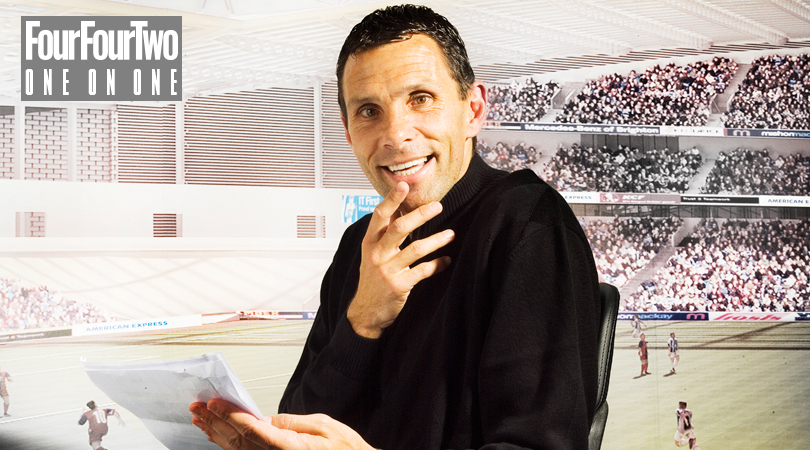
The best features, fun and footballing quizzes, straight to your inbox every week.
You are now subscribed
Your newsletter sign-up was successful
Want to add more newsletters?

Five times a week
FourFourTwo Daily
Fantastic football content straight to your inbox! From the latest transfer news, quizzes, videos, features and interviews with the biggest names in the game, plus lots more.

Once a week
...And it’s LIVE!
Sign up to our FREE live football newsletter, tracking all of the biggest games available to watch on the device of your choice. Never miss a kick-off!
Join the club
Get full access to premium articles, exclusive features and a growing list of member rewards.
"I really don't want to lose my hair," admits Gus Poyet, and for the first time today, he's not smiling. FFT is half an hour into our meeting with the Brighton gaffer at the club's new £96m Amex Stadium on the outskirts of the city, and the man affectionately known as 'The Radio' has changed frequency so often, it was only a matter of time before the topic of baldness came up.
He explains: "I try to forget about football after training, like Ruud [Gullit] did at Chelsea, but I just can't switch off. I've started playing golf, but by the time I've stopped talking about the game we're on the 18th hole!"
The Uruguayan was first given the 'Radio' moniker by his Real Zaragoza team-mates for his insistence on reciting the previous match, and it remains as apt a nickname as you'll find in football. And thankfully, the ex-Chelsea and Spurs man greets every one of your questions with similar glee. We begin in the shadows of the French Alps, when a young midfield dynamo first tried, and failed, to make his name in Europe...
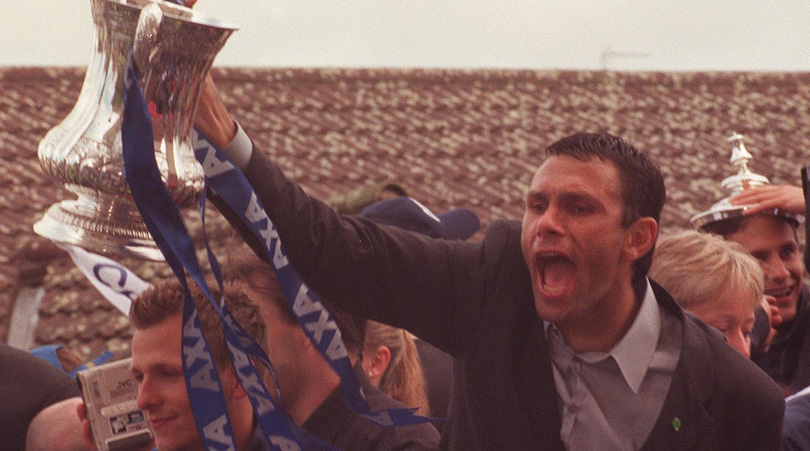
Spanish Copa del Rey (1994)
UEFA Cup Winners’ Cup (1995, 1998)
Copa America (1995)
European Super Cup (1998)
FA Cup (2000)
You first came to Europe as a 20-year-old, Gus, yet you were back home within a year. Why didn't it work out in France and did you think you'd ever get the return over here?
Roy Trevana, Dartford
I could look for excuses or reasons - the team I played for [Grenoble] wasn't the greatest - but the truth is I didn't perform well. I wanted to stay and make a point, but it wasn't possible. I honestly thought it would be very hard to come back to Europe, but I got my bit of luck. People think being a pro footballer is about talent and hard work, but at some moment you need a bit of luck, and I got it at Zaragoza. There was a Uruguayan manager [Ildo Maniero] there and another Uruguayan player was coming over, and I got in with them and never looked back.
I don't know anything about Uruguay. Is it true you're all obsessed by barbecues?
Lucy Harris, Swansea
Yes, football and barbecues! The way we get together is like how the English do to go for a drink, but we do this for an asado [barbeque]. I have a very close group of friends and when we get together, we eat and eat while talking about life and football. Two or three people are always in charge of cooking the meat, but I'm useless! I love to do it here but you need the weather, people to cook it, and a lot of meat!
You were player of the tournament when Uruguay won the 1995 Copa America. Where do these achievements rank in your career?
Kieran Raynor, Geneva
First, I wasn't player of the tournament; I was player of the tournament in my position. I know in England a lot of fans prefer club over country, but this is not the case in Uruguay so to win this cup was incredible for everybody. We played 4-3-3 with me at left midfield. It wasn't my best position, but because of our quality upfront - Francescoli, Fonseca, Otero - the rest of us did the running, we gave them the ball, and they won us the Copa America. I was so proud.
I can't believe a player with your talent only won 26 caps, Gus. What's the story there?
Paul Arthur, via email
I did start late for Uruguay [aged 25], but I'll be honest, the team played the worst kind of football for my ability. I was lucky enough to play in club teams that kept hold of the ball, looked to put it wide and created opportunities for me to arrive late in the box. But it was very different for the Uruguay national team during my time: the football was very direct and it was all about giving the ball to the strikers. I had no chance to get in the box and that's why I only scored three goals. I didn't get any chances!
The best features, fun and footballing quizzes, straight to your inbox every week.
I'd love my own radio show, although I think I'd need a six-hour slot, daily!
If you hadn't made it in football, what do you think you'd be doing? Having seen you talk on TV, you're clearly comfortable in front of the microphone. Ever consider a media career?
Gareth Ford, via Facebook
I'm not called 'The Radio' for nothing! [laughs]; I'd love my own radio show, although I think I'd need a six-hour slot, daily! In all seriousness, I was studying to be an engineer, so that's probably what I'd have done. I like maths and trying to work out crazy problems. I was really into my studies and was going to do it at uni, until at 18 I realised I could be a footballer.
I remember you playing for Zaragoza against Arsenal in the 1995 Cup Winners' Cup Final when Nayim lobbed Seaman. What a goal! What did that win mean to the club and city?
D Felice, Rome
I've always said that at the Parc des Princes in Paris, they should put a plaque near the half-way line reading: 'Here Nayim scored the most incredible goal ever in the 119th minute', because no one will repeat what he did. I cried like a baby after that game and after we'd partied for 48 hours, the whole squad went out onto the [Zaragoza] pitch and we stood at the spot where Nayim kicked the ball. We tried to do it. Every single player. And then we tried again. No chance.
So what Nayim did made him special for me. I also thank Nayim because it was him who told me about English football. I remember him saying, "Don't try to score with your hand; Don't go down; Don't cheat…" He made me worried! But his advice helped a lot.
You joined Chelsea after seven years at Real Zaragoza. With all due respect to the Blues, weren't there bigger clubs of the time keen on you especially as you were going on a free?
Charles Baker, via Twitter
There were, but Chelsea came at the right time and made a firm offer. I could see something was building there and I wanted to be part of that. There was talk of other clubs being keen, Real Madrid being one as my team-mate [Fernando] Morientes had just joined them, and there was also a chance to go to Inter: supposedly it was either me or [Diego] Simeone, but there was nothing on the table when Chelsea came calling.
Inter would have been great, but I have to say English football was probably much better suited to my game.
That incredible scissor-kick volley against Sunderland at Stamford Bridge in 1999 - the best goal you've ever scored?
Mike Rogers, Putney
In terms of quality, no doubt. But I prefer other goals that were more important: the two against Newcastle at Wembley [2000 FA Cup semi-final] for example. I have such good memories of those goals at the old stadium. I loved the old Wembley, and I don't like the new one.
You can go to big stadiums across the world and find many that look the same as the new one, but before it was so unique. It was the Wembley: the proper Wembley where everybody wanted to play.
As a flair player in the Premiership, you must have been on the end of a few hefty tackles. Who was your toughest-ever opponent?
Kelly Young, Feltham
One name: Roy Keane. No doubt. We played in positions where we faced each other a lot: I was trying to attack and he was trying to stop me, so I had a few knocks and a few marks. Some remember Roy for the bad things he did, but he was so influential. Wow. Manchester United were a totally different team without him.
A friend of mine once told me there used to be three dressing rooms at Chelsea and you had to share yours with Hasselbaink, Melchiot and the elusive Winston Bogarde; is this true?
Gary Lewis, Oxford
Yes, it's true. This was at the old training ground [Harlington]. There was nothing wrong with the place but it wasn't the best for a team playing in the Champions League. When you joined the club you were given whatever space was free in one of the tiny changing rooms and you would keep that spot.
When Jimmy signed and was put in our room, we'd have such a laugh with him. He'd just come from Atletico and liked to try out his Spanish, but as soon as he went to say a word we'd all shout ‚ "gordo!" ("fat") back at him! [laughs] Listen, Jimmy was a big guy!
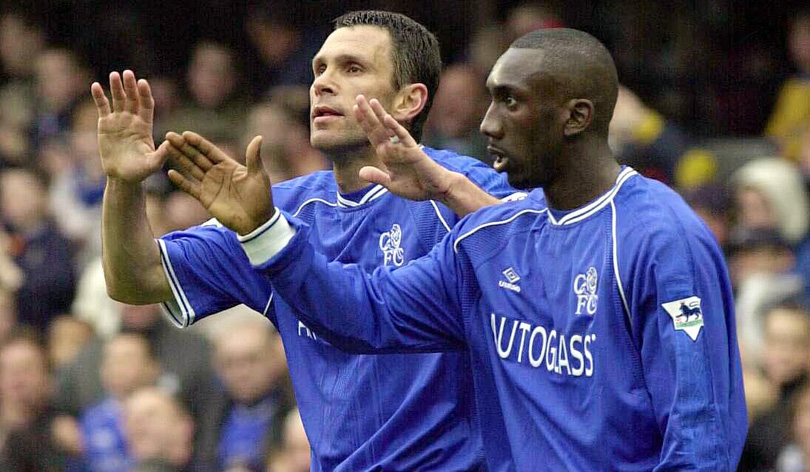
What were your first impressions of Claudio Ranieri when he arrived at Chelsea? Is it true that you were his translator for a while?
Helen Cooper, via email
Six months! For six months I was his translator! [FFT: How was that?] It was difficult, let's say, especially during training. I'd be trying to focus on one thing and the next minute I was helping the manager explain something complicated. I even had to drop players for him. I hated that. I'd say, "Look, it's not me saying this!" It wasn't nice to do.
You were a crowd favourite at Chelsea, Gus, so what were you thinking when you put in a transfer request and joined Spurs?!
Richard Sammons, Deal
Look, I'm a Chelsea fan. I think the fans know how much I gave to the club. The thing was, when I was there, Chelsea had not lost to Spurs in a long time so I didn't see them as rivals; normally, the teams fans do not like are the teams they cannot beat! I had the chance to go to Liverpool but I was keen to stay in London. But after I played against Chelsea, I remember thinking, 'Oh, what have I done?'
I'm not making excuses, I just didn't realise. It was my fault and I need to accept that. Yes, I celebrated by the Chelsea bench when we beat them 5-1 in the League Cup, but that was purely for Ranieri. He was why I put in a transfer request and it was personal.
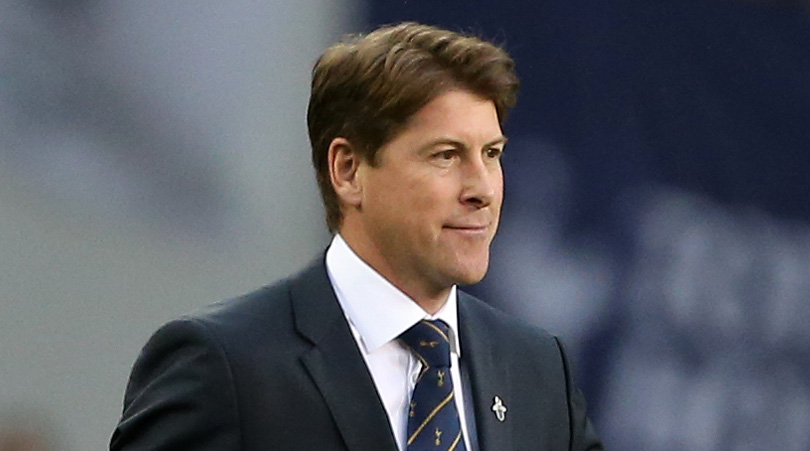
Darren Anderton, former Tottenham team-mate: "I can’t recall a team-mate who spoke as much as you, Gus. Have you ever worked with anyone who chats like you do, and have you calmed down a bit now you’re the manager?
"No, I haven’t changed at all. And no one talks as much as me. That’s just the way I am: I like to meet people, to talk about things. I’ve always, always talked about the game, and I make sure there’s time to do that with my Brighton players: not what we’re going to do after the game, or girlfriends or whatever, but time to talk business. My players like music in the dressing room, and that’s OK as I hate silence, but I make sure the time comes when the music stops. I may smile a lot but I can be tough also!"
Your goal record was fantastic. Did you ever consider playing as a striker?
James Khan, via Facebook
Yes, I was a striker before I moved to Spain. I played in midfield until I was 15, when I moved upfront. When I joined Zaragoza, they played 4-4-2; it was impossible for me to play as one of the two so I had to drop back.
You played under Gullit, Vialli, Ranieri, Hoddle and Pleat. Which of these did you enjoy playing for the most? And which was the hardest to play under?
S Singh, via email
Ruud was special. He was a manager who could concentrate on football like crazy at 10.30am, but then at 2.30pm, that's it, football's over. I'm trying to be more like him, because now I think about it 24/7. It's good to have that control of your life. You need time to relax, but some managers can't do this, which is why you hear of them having heart attacks! Then there was Ranieri, who didn't want to cope with strong characters. As soon as you showed you cared a bit too much for the team, he wanted you out. He's done it everywhere he's been.
How did you get the No.2 job at Spurs, Gus? Did you know Juande Ramos before then?
Mike Corrales, New York
I'm not a believer in coincidence but there were so many things that came together for me to get that job: I'd played for Spurs; the man who was central in getting him over from Spain was one of my best friends; and by then I'd had over a year as an assistant manager in League Two with Swindon, League One with Leeds, and then I found myself on the next step. It was amazing and I couldn't say no. But, no, I didn't know Juande before. Remember how we talked about how Ranieri used me in training before? Well, that was also how Juande needed me at first!
You and Ramos left White Hart Lane under a bit of a cloud. Did you feel bitter about what happened?
David Bash, via email
It was a tough time for me, it was the first time I was sacked and it wasn't nice, but you learn from it and I think it was the right decision. Seeing where Spurs are now, you have to believe that. Why try to make excuses? The only problem is, they need to win another trophy, because their last one was won by Ramos, and until they do, Ramos is in the history of the club.
I must say, though, the Berbatov situation didn't help us. He wanted to leave Spurs in May but the club refused to let him go until the last day of the transfer window. [Shrugs] What can you do?
I see your son Diego has just made his international debut for England U16s! Don't you want him to play for Uruguay?
Jerry Phillips, via email
It's something I don't want to push either way. One of the greatest things FIFA has done is realise that when boys are young, they feel pressure to make a decision. In the past, you couldn't change: if you played one minute for one national team, that was it. But thankfully FIFA has changed things, so I think conditions are perfect for Diego to play here. He's played in England for years, so it's natural. Then, if Uruguay call him up one day, it's his decision.
If he wants to be a pro he can't go out drinking with 25 different girls
Congrats on your son's Three Lions call-up, Gus! What advice have you given him?
Glen Keller, via Twitter
He won't thank me for saying this, but his girlfriend rang me up the other day and I warned her that the age he's at is the worst time for footballers. I think Diego knows this and he's a good boy, but I'm trying to ensure he's surrounding himself with people who realise if he wants to be a pro he can't go out drinking with 25 different girls. When I was his age, many players were better than me, but when they got to 16 they started living la vida loca; game over. I was committed. I missed out on stuff and it hurt. But you decide on your career.
I have to ask about Luis Suarez's deliberate handball in the World Cup, Gus. Be truthful: what would you have done in that situation?
Leigh Avery, Bristol
The same. No question. I heard people say it was cheating, but cheating is when you simulate that someone's kicked you when they haven't, or when you go down for a penalty when there is no touch. But Suarez didn't cheat. It's like if someone's one-on-one with the keeper in the last minute and you bring them down: you put your team ahead of yourself and you get a red card. That doesn't mean you're cheating. Listen, Suarez is a hero. I'd advise any of my players in that situation to do exactly the same.
How does Brighton beach compare to the beaches of Montevideo?
Anth Barlow, Swanage
I'm sorry, but I have to say the beaches at home are much better. We have very soft, white sand. I'm not such a fan of the big stones! I was used to living near the sea, so I like Brighton. I haven't been able to take the family to the beach yet: this summer was too complicated with my first pre-season here, the World Cup, my son starting at Charlton, but I will!
I know it's ugly, but given our great form at the Withdean, are you sure we want to leave?
Dan Tso, via email
Yes. Yes. Yes! Why? Because this place is going to be incredible. The atmosphere will be amazing when it's filled with 22,500 fans. The Withdean is horrible. I even feel sorry for the away fans. I shouldn't, but at night games you cannot even see them. I feel such pity for these people.
Someone told me that one of your first signings at Brighton gazumped you on a seafront property when you first moved here! Did you make the guilty party pay in training?
John Sneed, Brighton
Yes, it was a lovely seafront flat. I wanted it but he nicked it from me! OK, I'll tell you who it was: [Inigo] Calderon. He took it! I haven't made him pay in training, but that's a good idea!
You won the FA Cup with Chelsea, Gus, but have you had a chance to watch the 1983 classic between Brighton and Man United?
Jason Werner, Kingston
People talk about that game a lot down here, but I haven't seen it. I'm not that concerned with history. Remember, I come from a place where we won the World Cup in 1930 and 1950 and we didn't stop talking about it for 50 years. I really didn't like that. Football has changed and Uruguay needs to move on. Here, it is the same. Let's try to get to the final and win it this time!
Interview: Charlie Ghagan. Portrait: Steve Orino. From the January 2011 issue of FourFourTwo. Subscribe!
 Join The Club
Join The Club










